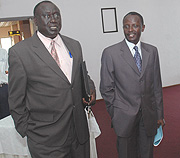KIGALI - A draft report of budget expenditure in the Rwandan judicial institutions and other related departments has revealed that there is lack of absorption capacity for allocated budgets.


KIGALI - A draft report of budget expenditure in the Rwandan judicial institutions and other related departments has revealed that there is lack of absorption capacity for allocated budgets.
14 institutions that have justice in their attributions yesterday met in Kigali for the first ever Justice Sector Joint Review, with an aim of evaluating budget expenditure and come up with appropriate measures for future planning.
The institutions, grouped into what is known as Justice Reconciliation Law and Order Sector (JRLOS), serves as an umbrella of these institutions and their development partners.
Justice Minister Tharcisse Karugarama said that the lack of capacity to use the allocated budget has to do with little or no prior planning, calling upon the institutions to make strong and analytical planning beforehand.
"There isn’t enough money for the sector, but on the other hand there is underspending of the little we get, which is more dangerous and discouraging to our development partners,” Karugarama told the representative of various institutions.
He said that the Justice Sector Review is a very critical step that will help in making an evaluation of their activities and see how they have accomplished their targets.
He strongly condemned the lack of absorption capacity for the budget, saying it would actually sound better to spend it all than underspending, because other people may have the need and capacity to appropriately use the money.
"We are going to be having very regular monitoring and evaluation to make a continuous review of the budget and activities,” he underscored, saying that this is a way to allocate and distribute the budget according to every institutions’ needs.
Karugarama however called for the collaboration between the institutions for the development of the common understanding and approaches to EDPRS (Economic Development and Poverty Reduction Strategy), a clear definition of roles and responsibilities and contribution to the shared networks in the justice sector.
"I want us to commit ourselves to the success of EDPRS through the implementation of the JRLOS’s objectives,” he said.
"Justice is a nature chain from the beginning to the end, and therefore requires collaboration.”
EDPRS is a medium term framework established by the government to achieve the country’s developmental goals enshrined in the Vision 2020 instrument.
Apart from the Ministry of Justice, other institutions that form the Justice Reconciliation Law Order Sector include the Office of the Prosecutor General, Military Prosecution, the National Police and the National Human Rights Commission among others.
Ends


